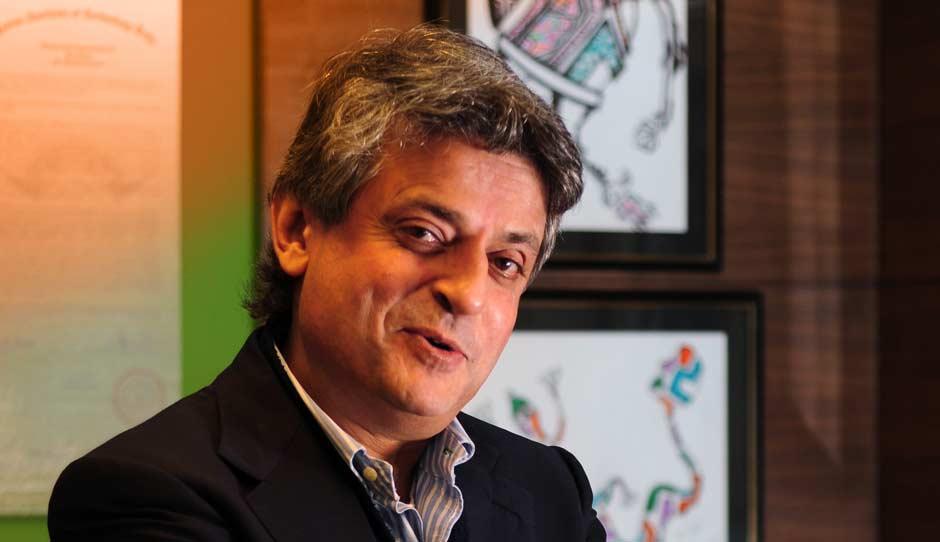Room to Roam: Lemon Tree Hotel's Patu Keswani
- BY Shreyasi Singh
 In
In  14594
14594 0
0

An unlikely entrepreneur, Patu Keswani combined engineer-like ratios to build a perfect hotel in Gurgaon in 2004. Today, his Lemon Tree Hotels is a pan-India hospitality group—India’s fourth largest, Keswani claims—with 2,000 rooms across 13 cities. Lemon Tree Hotels have a strong brand—of being both affordable and efficient, much like a low-cost airline. In two years, Keswani wants his venture to be the largest hotel company in India with 4,000 rooms and Rs700 in turnover. He’s also building other companies in affordable housing and vocational training—competencies, he says, he’s developed while building Lemon Tree.
My father was in the railways, and my mother was an army doctor. Growing up, it never crossed my mind that I’d be working for myself. Being an entrepreneur is very life cycle, environment-linked. Like in a lot of business families, some people know right from the beginning that they don’t want to work for anybody else. It wasn’t like that for me.
I did my Bachelor’s in electrical engineering from IIT Delhi in 1981 and followed that up with a management degree from IIM Calcutta. I started my career with Tata Administrative Services. I spent 15 years with the Tata Group. My last designation in the Tata Group was as the senior VP and COO of the Taj Group of Hotels. There were 21 hotels in my group. I wanted to improve their performance, so I made a lot of ratios. Basically, I wanted to make a services business, like a manufacturing process, by identifying the key levers to success. I asked all hotels to send me their ratios. For each ratio, I picked up the best and hypothesised that it’s possible to build a hotel that will make 50 per cent profit.
The weave of life started to come together. After Taj Hotels, I joined AT Kearney, an American consulting firm. They paid me a lot of money for that time—over a crore each year plus bonuses. I thought I’d work for three years, make a million dollars (in the flush of youth, I thought I’d get a lot of bonuses) and do whatever I wanted after that. With them too, I worked with hotel clients and saw how the valuation game worked. If I put in a buck, made half of that in profit, I knew I could get a valuation three times my investment. This was still the late 1990s. We were used to 10 per cent returns on capital—the Reserve Bank of India rate. Going out on my own began to make smart business sense.
My decision to be an entrepreneur was taken in five minutes. I’d managed to save around Rs2.5 to 3 crore. This freed me from the tyranny of material needs and liberated me from having to work for anybody else. I could say no to a job. My parents cribbed like mad to everyone else but me when they heard I was taking the step. Being a businessman in those days had a connotation of being corrupt.
Education excites me more than real estate. I want to educate 10 million people.
At that time, my ambition was determined by the money I had. Then, the point of building Lemon Tree was not Lemon Tree. It was to build one hotel with the “perfect ratios” that I’d worked out at Taj. When I found the plot of land in Gurgaon where I would build the first hotel, I didn’t get a loan. I’d grown a ponytail by then, and bankers thought I was some kind of a junkie. I needed more money, so friends pitched in. I raised some Rs6 to 7 crore from them. But I ensured that I was still the main shareholder.
Basically, I wanted to make a hotel which would be the low-cost carrier equivalent of the hospitality industry like an Indigo. There are three things you expect in an airline—safety, cleanliness and on-time performance. These are basic parameters. But, if the market is not performing to these expectations, and you can offer these services, that becomes your differentiator. Like Indigo did. We did that with Lemon Tree. The Gurgaon hotel, which opened in May 2004, did very well. Some HNIs who knew me well, came and put in money and I created a new company. We opened a second hotel in Gurgaon exactly a year later.
We were forced to develop many core competencies to build the hotels. In the US, which is the most mature market, developing hotels is relatively easy. The tough part is getting customers and getting your brand to stand out. In India, there are fewer hotels mainly because of the structural issues related to the real estate sector. While in the US, it’s the brand that matters; in India, it’s the hotel that is important. To run hotels here, you have to own the assets. Also, hotels in India are built according to individual specifications. You can’t have a coherent brand if you work with different products and vastly different-looking hotels. My perspective was to have a certain standardised product that offers standardised services—what the brand stands for. So, we started building our own hotels. Construction became a core competence. And, we became an end-to-end player—owning and developing hotels, managing hotel services and having a brand.
Plus, when we started, we got people who couldn’t find jobs in the Taj, ITC or an Oberoi. We had to become competent at training. It was another core area that we developed. I have a low threshold for routine. When Lemon Tree grew to two, three then four hotels, I started to get bored with it. When it started expanding, I had to ask myself—did I want to get on to this roller coaster? But I was being driven by people who had invested in the company, and wanted to see it grow.
 Patu Keswani receiving the Shell Helen Keller award in 2010 for employing more than 110 deaf and dumb employees at Lemon Tree Hotel.
Patu Keswani receiving the Shell Helen Keller award in 2010 for employing more than 110 deaf and dumb employees at Lemon Tree Hotel. In July 2006, things got exciting when Warburg Pincus invested Rs280 crore in the company. We took Lemon Tree to an all-India scale. We also launched another brand, Red Fox Hotels, a new chain of limited service budget or economy hotels, in mid-2006. While room tariffs in Lemon Tree were in the Rs3,000 to 5,000 per night category, in Red Fox, we targeted Rs800 to 2,000 per room per night.
Things have moved very fast for us. In less than 10 years, Lemon Tree has gone through four distinct phases. In the beginning, we were one brand, two hotels, 100 rooms, 100 people and Rs10 crore in turnover. Two years later, we had 300 rooms across five cities, a turnover of Rs30 crore, but still one brand. Two years later, we were 10 hotels, Rs100 crore turnover, two brands, and 1,000 people across eight cities. Today, we’re the fourth-largest hotel company in India with more than 2,000 rooms and an equal number of people across two brands in 13 cities. Two years from now, we’ll be close to the largest hotel company in India with 4,000 rooms and Rs700 crore in turnover.
The best years for me were the first three years—the journey was incredible. Now, we have the problems of a large company. Today, the challenges are political and cultural. It’s not the stuff that I find exciting. They are similar to the challenges I faced as a senior employee at Taj Hotels or at AT Kearney 10 years ago. People are our challenge. We have no other problems. The business model works, I can extend it. The brand doesn’t need too much people-investment. It’s the management of hotels which we need to scale-up. That is heavily dependent on people.
How do I get my core 1,000 people, who have stayed with me over the past four years, to actualise their potential? They have an attitude and a passion now. But, they still lack experience. If you work with Oberoi or Taj, you become general manager of a 200-room hotel after 15 years. A typical general manager with me is 30 years old, has worked for maximum five years and manages an equally complex operation. They still need a lot of soft-skills training and maturity. Earlier, my philosophy was to promote internally. But now at the scale at which we’re growing, we need to get external talent. For the next two years, my role will be to develop talent and manage the culture.
My milestone for Lemon Tree is to be the largest hotel chain in Asia, in terms of owned-rooms. I think we can get there. We’ve also been committed to hiring differently-abled people in our workforce. Five per cent of our employees, roughly around 110 employees, are hearing and speech impaired. I want to raise that number to 10 per cent by 2013. In fact, winning the Shell Helen Keller Award in 2010, and the realisation that we could impact people’s lives felt great.
My milestone for Lemon Tree is to be the largest hotel chain in Asia, in terms of owned-rooms."
The real task ahead for me is to see through the new businesses that I’m setting up. These are a real estate joint venture to develop affordable housing with Warburg Pincus, and a vocational education business. Over the last couple of years, these businesses have spun-off from the competencies I was forced to develop. I started to look at the value chain and see if I could disaggregrate them into individual businesses.
People ask me why real estate. Well, we have the competence to build in time, in cost and in quality to the specifications we laid out. That’s not easily found in the real estate business. Education excites me even more than real estate. There are 600 million Indians under the age of 30. Most companies only chase the 30 million or so for jobs, the ones who can speak English. If I can help play a role in educating and making employable a few million of the 570 million we don’t look at, that’s something worth doing. I want to educate 10 million people. I don’t know how long it will take. But it’s a target I’ve set for myself, a promise I made to my dad.
Ideally, I’m looking at being a very involved angel investor to these businesses. I don’t think I can give them the passion and attention I gave to Lemon Tree 10 years ago. I’m older, the fires have ebbed. But I bring on board more experience, more capital and can leverage our strengths—hopefully, that should compensate for the passion.
I’ve reached a stage where I don’t want to be so involved any more. Right now, I’m hands-on. I shouldn’t be, but there it is. I’d be very happy to let go, but I don’t think the organisation is in a place where I can. We want to take the company public in 2013. After that, I’ll just be a chairman-cum-shareholder. Because of the downturn, the past two years have required my close attention. A lot of the things that we had planned, like getting off the ground with our affordable housing project, did not happen.
If there’s one lesson that I’ve learnt as an entrepreneur, it is that the business model gets screwed up if you don’t factor in the fundamentals properly. It’s the wrong time to invest in real estate right now. So, we’ll wait. It’s a large investment and we want to do it right. If you do it badly the first time, you’re in disaster management mode from the word go.





























Add new comment